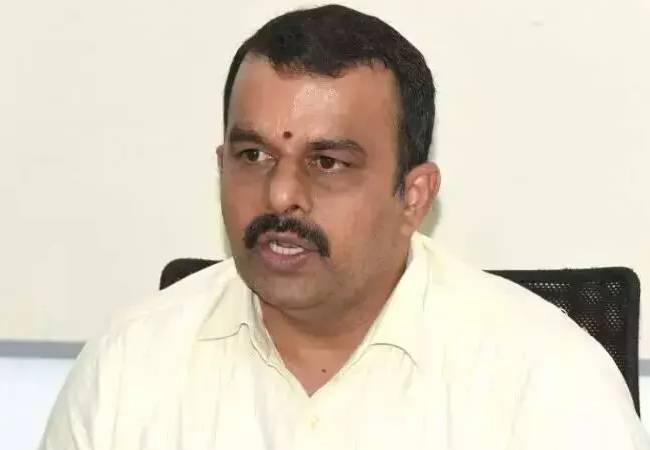Bengaluru, Nov 27: With the number of COVID-19 infections at Dharwad's Medical College reaching 281 and new clusters emerging in Bengaluru amid the threats of new variant 'Omicron', Karnataka Chief Minister Basavaraj Bommai on Saturday hinted at putting in place certain precautionary measures to control the spread of virus.
The state government has already issued guidelines for those travelling from certain foreign countries, where the new variant is prevalent, aimed at checking its spread.
"We have observed the COVID spread at schools, colleges and hostels in Dharwad, Bengaluru and Bengaluru rural areas, and increase in cases in neighbouring Kerala. We have to immediately take precautionary measures to control it, so I have called a meeting of Health, disaster management officials, also COVID advisers and experts. We will also discuss about new strain." Bommai said.
Speaking to reporters here, he said, "Not only medical precautions, the measures that need to be taken publicly will be important, they should be taken immediately."
The number of positive cases in Dharwad's SDM College of Medical Sciences and Hospital has increased to 281, official sources said.
According to official sources, most of the infected are asymptomatic, while very few have mild symptoms, and they have all been kept in isolation.
As a precautionary measure, Dharwad district administration has declared holiday for schools and colleges within a 500-metre radius of the medical college and hospital; also OPD services there have been shut down for three days.
Meanwhile, 12 Kerala students of a nursing college in Anekal on the outskirts of Bengaluru tested positive for COVID, and 33 students and a staff member have tested positive for infection at a private unaided (boarding) school on Thursday in Dommasandra near Sarjapura.
Officials said all the precautionary measures have been taken at both these institutions.
Noting that samples of students who have tested positive at Dharwad's SDM Medical College have been sent for genomic sequencing, Health Minister K Sudhakar said, "so far 281 people there have tested positive (for COVID), some samples have been sent for genomic sequencing and the reports are expected by December first week, so that we will get to know about the variant."
Observing that from last one week in four to five countries like Botswana, South Africa, Hong Kong and Israel, cases of the new variant have been detected, he said, "since last nine months delta variant was spreading across the world and the two doses of vaccine we have been administering had the power to prevent its spread, but the information is that this new variant B.1.1.529 or Omicron is spreading very rapidly."
"There seems to be some concern about it (new variant), but I want to tell people that there is no need to worry as of now. We have already held a meeting in this regard and have given guidelines for airports stating that those travelling from these countries to Bengaluru have to undergo a test despite having COVID test report, and they will be allowed outside the airport only after testing negative," he said.
"Even after testing negative they will have to remain at home and after seven days they will have to undergo a test once again, and after getting a negative report, one can go out," he added.
Let the Truth be known. If you read VB and like VB, please be a VB Supporter and Help us deliver the Truth to one and all.
Jammu: A 22-bogie train chugged between Katra and Srinagar railway stations on Sunday, officials said, marking the first successful trial run on the newly completed line to connect Kashmir with the rest of the country via rail.
The train, comprising 18 AC coaches, two luggage carriers and two engines, left the Katra railway station at around 8 am, successfully reaching its destination within four hours under the watchful eyes of the railway authorities, the officials said.
This was the first trial run between Katra and Srinagar, and came within six days after the Commissioner of Railway Safety (Northern Circle) Dinesh Chand Deshwal authorised the opening of the newly constructed Broad Gauge line.
He had given the authorisation for the start of public carriage of goods and passenger traffic in a seven-page letter to the ministry and railway authorities, based on his detailed inspection of the track on January 7 and 8.
The CRS referred to his inspection of the newly constructed BG line between the Katra and Reasi section by a motor trolley and on foot, followed by a speed trial on the entire section from Katra to Banihal.
He had then authorised regular opening of the section for passengers and freight traffic at a maximum permissible speed of 85 Kmph on the main line and 15 Kmph on turnout.
The work on the dream project to link Kashmir by train was started in 1997 and it missed several deadlines given geological, topographical and meteorological challenges.
Out of the total 272 km Udhampur-Srinagar-Baramulla Rail Link (USBRL) project, 209 km was commissioned in phases with the first phase of the 118 km Qazigund-Baramulla section commissioned in October 2009, followed by 18 km Banihal-Qazigund in June 2013, 25 km Udhampur-Katra in July 2014 and 48.1 km long Banihal-Sangaldan stretch in February, last year.
The work on the 46-km Sangaldan-Reasi section was also completed in June last year, leaving a total of 17 km stretch between Reasi and Katra. And this section was finally completed in December 2024 as announced by the Railway minister Ashwini Vaishnaw.
On January 4, a successful trial run of an electric train was successfully conducted on the Katra-Banihal section. The railways has conducted six trials over the past month on various segments of the track, including the two major milestones of the Anji Khad and Chenab bridges.
Katra-Srinagar Rail Link: First 18-Coach Train Completes Trial Run Successfully pic.twitter.com/p68axcUClX
— Daily Excelsior (@DailyExcelsior1) January 19, 2025





